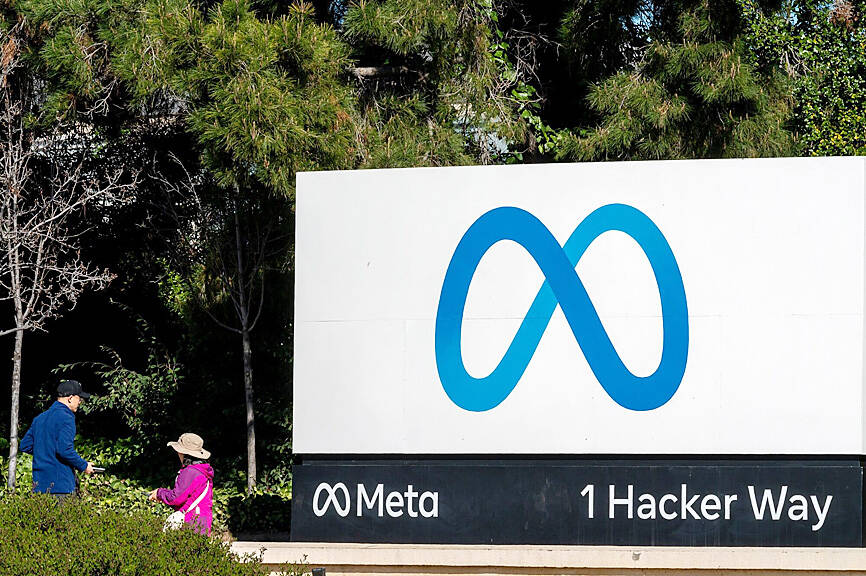Meta Platforms Inc on Wednesday posted sharply higher profit and revenue for the final quarter of last year, thanks to higher ad revenue on its social media properties, sending its shares up in after-hours trading even as it forecast increasing expenses on its artificial intelligence (AI) efforts.
CEO Mark Zuckerberg said he expects this year to “be the year when a highly intelligent and personalized AI assistant reaches more than 1 billion people, and I expect Meta AI to be that leading AI assistant.”
The company earned US$20.83 billion in the October-December quarter. That is up 49 percent from US$14.02 billion in the same period a year earlier. The parent company of Facebook, Instagram, and WhatsApp saw its net income soar 59 percent to US$62.36 billion for the full year.

Photo: Bloomberg
Revenue grew 21 percent to US$48.39 billion from US$40.11 billion in the fourth quarter, and 22 percent to US$164.5 billion last year, boosted by advertising performance as ad prices rose 10 percent and impressions increased 11 percent across its platforms.
For the current quarter, Meta said expects revenue of US$39.5 billion to US$41.8 billion. Analysts are expecting revenue at the high end of that range — US$41.68 billion.
The company also said it expects expenses in the range of US$114 billion to US$119 billion, driven by infrastructure costs and employee compensation. Meta had 74,067 employees as of Dec. 31, up 10 percent from a year earlier.
“By beating both earnings and revenue estimates, they’ve demonstrated that cost discipline and efficiency gains are paying dividends,” Investing.com analyst Jesse Cohen said. “However, the real headline is their commitment to aggressive capital expenditures. This signals Meta is doubling down on its AI infrastructure and metaverse ambitions, even as investors grapple with the costs.”
Separately, Meta has agreed to pay roughly US$25 million to settle a 2021 lawsuit that US President Donald Trump brought against the company and Zuckerberg after Trump’s accounts were suspended following the Jan. 6, 2021, attack on the US Capitol.
“This is also going to be a big year for redefining our relationship with governments,” Zuckerberg said in a conference call with analysts. “We now have a US administration that is proud of our leading companies, prioritizes American technology winning, and that will defend our values and interests abroad. And I’m optimistic about the progress and innovation this is going to unlock.”
Meta’s stock rose 2 percent to US$690.02 in after-hours trading.

Meta Platforms Inc offered US$100 million bonuses to OpenAI employees in an unsuccessful bid to poach the ChatGPT maker’s talent and strengthen its own generative artificial intelligence (AI) teams, OpenAI CEO Sam Altman has said. Facebook’s parent company — a competitor of OpenAI — also offered “giant” annual salaries exceeding US$100 million to OpenAI staffers, Altman said in an interview on the Uncapped with Jack Altman podcast released on Tuesday. “It is crazy,” Sam Altman told his brother Jack in the interview. “I’m really happy that at least so far none of our best people have decided to take them

BYPASSING CHINA TARIFFS: In the first five months of this year, Foxconn sent US$4.4bn of iPhones to the US from India, compared with US$3.7bn in the whole of last year Nearly all the iPhones exported by Foxconn Technology Group (富士康科技集團) from India went to the US between March and last month, customs data showed, far above last year’s average of 50 percent and a clear sign of Apple Inc’s efforts to bypass high US tariffs imposed on China. The numbers, being reported by Reuters for the first time, show that Apple has realigned its India exports to almost exclusively serve the US market, when previously the devices were more widely distributed to nations including the Netherlands and the Czech Republic. During March to last month, Foxconn, known as Hon Hai Precision Industry

PLANS: MSI is also planning to upgrade its service center in the Netherlands Micro-Star International Co (MSI, 微星) yesterday said it plans to set up a server assembly line at its Poland service center this year at the earliest. The computer and peripherals manufacturer expects that the new server assembly line would shorten transportation times in shipments to European countries, a company spokesperson told the Taipei Times by telephone. MSI manufactures motherboards, graphics cards, notebook computers, servers, optical storage devices and communication devices. The company operates plants in Taiwan and China, and runs a global network of service centers. The company is also considering upgrading its service center in the Netherlands into a

Taiwan’s property market is entering a freeze, with mortgage activity across the nation’s six largest cities plummeting in the first quarter, H&B Realty Co (住商不動產) said yesterday, citing mounting pressure on housing demand amid tighter lending rules and regulatory curbs. Mortgage applications in Taipei, New Taipei City, Taoyuan, Taichung, Tainan and Kaohsiung totaled 28,078 from January to March, a sharp 36.3 percent decline from 44,082 in the same period last year, the nation’s largest real-estate brokerage by franchise said, citing data from the Joint Credit Information Center (JCIC, 聯徵中心). “The simultaneous decline across all six cities reflects just how drastically the market